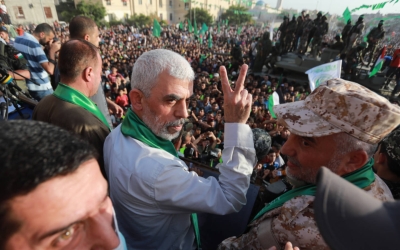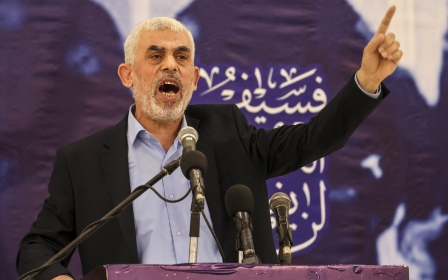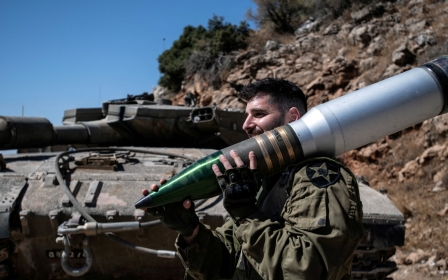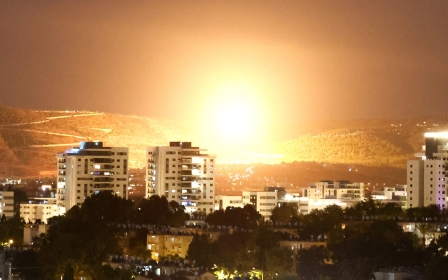Yahya Sinwar died fighting Israel. His death will not defeat Hamas
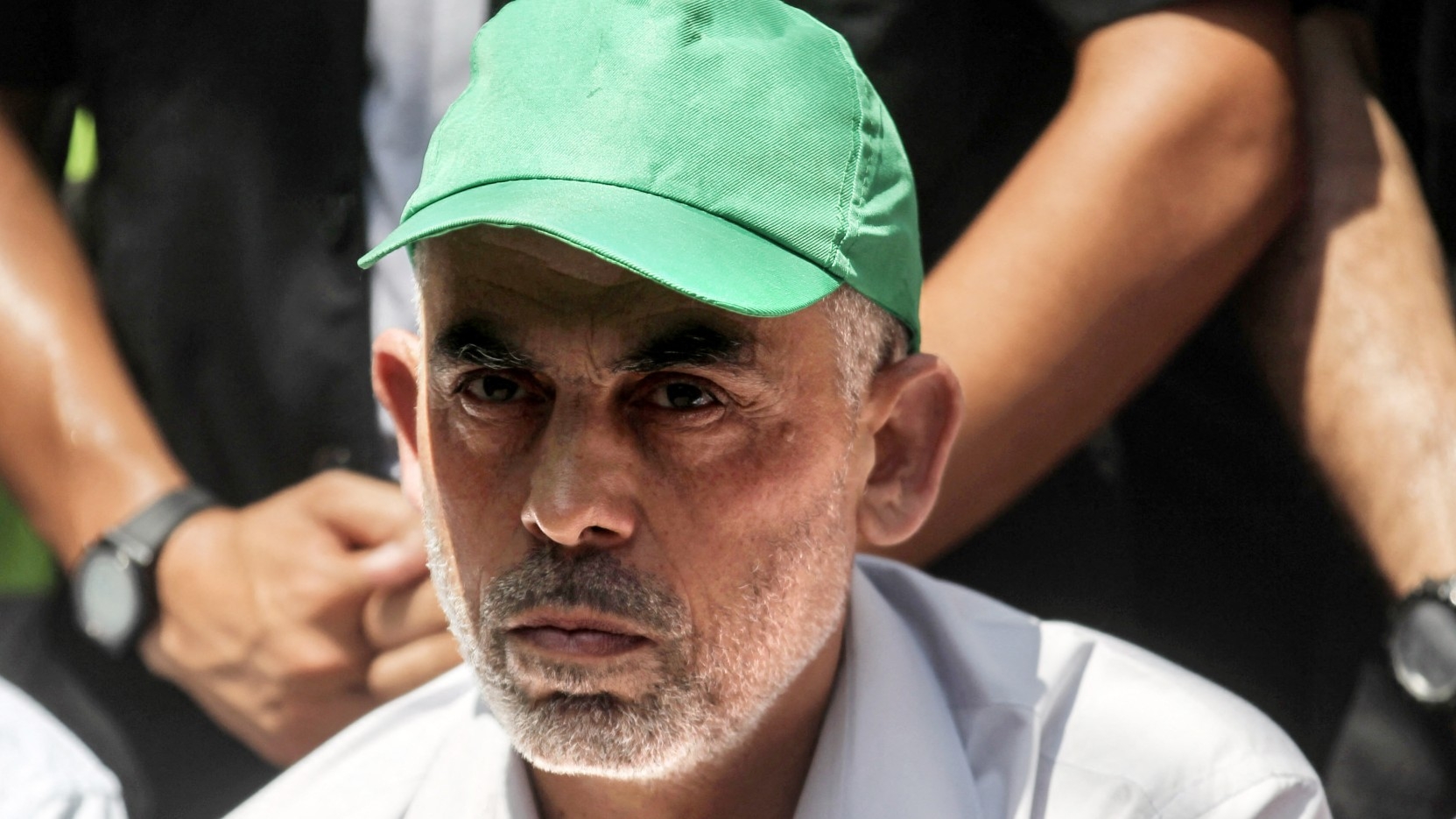
The early pictures posted on social media of Hamas leader Yahya Sinwar lying dead inside what seems to be a partially demolished house in Gaza may not have been what the Israeli leaders wanted the world to see.
It has been suggested that the soldiers who found the dead body and suspected it was of Sinwar hurriedly photographed him and sent the pictures to some acquaintances who in turn posted them for the world to see.
Their superiors had in mind a different narrative as to how the man died.
They would have preferred to draw a picture of a Hamas leader hiding in a tunnel using Israeli hostages as human shields. The truth is that Hamas' top leader lost his life fighting his enemies.
Not only that.
New MEE newsletter: Jerusalem Dispatch
Sign up to get the latest insights and analysis on Israel-Palestine, alongside Turkey Unpacked and other MEE newsletters
The pictures show a bullet wound in his head. He was not trying to escape, as Israeli Prime Minister Benjamin Netanyahu would have wanted the world to believe, but rather died in confrontation with the Israeli soldiers standing face to face.
From the Palestinian perspective, this would be considered the most noble and the most honourable of deaths.
Undisputed leader
Yahya Sinwar, or Abu Ibrahim as he is known within Hamas circles, was born in Khan Younis refugee camp in the Gaza Strip in October 1962 to a family of refugees hailing from the Palestinian city of Majdal. In 1948, Zionist gangs occupied the village during the Palestinian Nakba (the creation of the state of Israel) and renamed it Ashkelon.
Like many thousands of residents of areas located to the north of Gaza, which became overnight the "State of Israel", Sinwar’s family fled southwards for what they thought at the time was going to be a temporary refuge.
All such refugees were convinced that within days they would be back home as soon as troops from neighbouring Arab countries managed, as promised, to come to their aid, securing their towns and villages and deterring Jewish gangs that were perpetrating massacres to drive the Palestinian population out. It was not to be.
Sinwar went to school in Gaza and studied Arabic Literature at the Islamic University. He was an active student at high school and at university where he joined the Muslim Brotherhood’s chapter in Palestine. He was first detained by the Israelis at the age of 20 in 1982 for 10 months and once again in 1985 for eight months.
When Hamas was born in 1987, Sinwar emerged as one of its prominent operatives and was commissioned by the founder of Hamas, Sheikh Ahmad Yassin, with the task of setting up a security apparatus known as Majd. One of the objectives was to detect, pursue and punish collaborators who informed Israeli occupation forces on Palestinian activists within the strip.
Before long, he was eventually arrested in 1988 and sentenced to four life terms for kidnapping and killing two Israeli soldiers and for killing four Palestinians suspected of collaboration with Israel.
He remained in Israeli detention for 23 years, during which he learnt Hebrew and translated or wrote several books. He also played a prominent role in managing the affairs of Hamas detainees and coordinating relations and settling disputes with detainees from other factions.
Hamas is an institutional movement with no personality cult. Leaders who perish are immediately and smoothly replaced
In 2011, he was one of more than a thousand Palestinian detainees released in exchange for one Israeli soldier called Gilad Shalit. Following his emancipation, Sinwar held senior positions within the movement.
Just one year after his release from detention, he was elected in 2012 as a member of Hamas' political bureau and played a leading role in administering the movement’s military wing, Izziddin Al-Qassam Brigades.
Sinwar gained further prominence in 2021 when he was elected head of the Hamas local organisation in Gaza. This was the year when tensions in Jerusalem over Jewish settlers’ repeated attempts to storm into Al-Aqsa Mosque and Israeli restrictions imposed on Palestinian worshippers, sparked yet another war in Gaza that lasted for 11 days.
This was Israel’s fourth major attack on Gaza in 14 years. There was so much devastation and hundreds of casualties. Yet, the war established Sinwar as the undisputed leader of the enclave.
According to a recent New York Times report citing Hamas documents, which the Israelis allegedly found in a laptop in Gaza, Sinwar and a very close circle of a few of his comrades started preparing for a major offensive against Israel as early as 2021.
Following Israel's assassination of Ismail Haniyeh in Tehran on 31 July 2024, after lengthy deliberations and much speculation, Hamas's Shura Council named Sinwar successor to Haniyah as the new political leader of the movement on 5 August.
This was surprising to many observers.
A resilient movement
According to convention, such a position would usually be filled by a Hamas figure in the diaspora because of the political and diplomatic tasks the position entails that require free movement.
Khaled Meshaal was thought by many to be the likely candidate. Yet, Meshaal refused to accept the nomination and insisted that Gaza, which had been resisting Israeli aggression, should alone have the right to lead the movement during this critical period in the history of the movement.
Israel succeeded many times before in almost decapitating the movement. Yet, it has not managed to weaken its resolve let alone crush it
Although the killing of Sinwar will be seen as another major blow to Hamas, it is highly unlikely that it will affect its long-term strategy.
Israel succeeded many times before in almost decapitating the movement. Yet, it has not managed to weaken its resolve, let alone crush it.
The list of top leaders eliminated since the emergence of Hamas on the Palestinian scene in the late 1980s is quite long. It includes the movement’s founder Sheikh Yassin on 21 March 2004, and his successor Abd al-Aziz al-Rantisi on 17 April 2004.
The leader of Hamas's military wing, Izziddin Al-Qassam Brigades, Ahmed al-Jaabari, was assassinated on 14 November 2012. More recently the Israelis assassinated Hamas deputy leader Salih al-Arouri on 2 January 2024 and the movement’s political leader Ismail Haniyeh on 31 July.
The resilience of the movement derives from two factors. First, Hamas stands for an idea, and the idea is that the Palestinians once had a homeland that was taken away from them to make way for the creation of a Jewish homeland deemed a century ago to be the perfect solution to Europe’s Jewish problem.
The Palestinians have been struggling to go back home for more than three-quarters of a century.
The emergence of Hamas was not just a consequence of the Palestinian intifada (uprising) that erupted one day before the movement’s birth, but also a consequence of the decision by the Palestine Liberation Organization (PLO) leadership under Yasser Arafat to renounce resistance in favour of a peace-making deal with Israel. This has proved to be an utter failure, nothing less than a capitulation.
With the passage of time, Hamas was vindicated, and the PLO lost its representative status of the cause in the minds of most Palestinians. The Oslo Accords between the PLO and Israel only turned the former into a security collaborative agency working for the latter.
Since 1993, the Palestinians have seen more of their lands confiscated, more of their houses demolished and more of their sons and daughters killed, maimed or detained by the Israelis.
Sinwar, like all his predecessors who were assassinated by Israel, will be celebrated by many people as a great martyr who perished fighting invaders
The promised Palestinian state never saw the light of day and the two-state solution turned into a mirage, as Jewish settlements have taken over much of the Palestinian territories in the West Bank and East Jerusalem.
The second factor is that Hamas is an institutional movement with an elected leadership. It has no personality cult, and leaders who perish are immediately and smoothly replaced.
It remains to be seen who is likely to succeed Sinwar. Perhaps this time it is more likely to be someone in the diaspora.
And it is possible that the movement will decide to live for the time being with a deputy leader until the elections are held. However, elections are unlikely to be held until the war is over, and that is something hard to predict when the flames of the conflict seem to extend beyond Palestine to engulf the entire region.
No end in sight
Finally, despite the loss, martyrdom has always been a powerful recruitment tool. In Palestinian - as in the Islamic - culture, martyrdom is not a loss but a gain.
Sinwar, like all his predecessors who were assassinated by Israel, will be celebrated by many people as a great martyr who perished fighting invaders.

There are, expectedly, speculations as to whether the killing of Sinwar will pave the way for ending the war soon.
The war can end if Israel agrees to the terms of a ceasefire already accepted by Hamas and originally proposed by US President Biden.
However, if Netanyahu still insists on destroying Hamas and liberating the hostages without offering anything in exchange, it is highly unlikely that we shall see an end to the fighting any time soon.
There is of course the risk that Sinwar’s removal from the scene might embolden Netanyahu further, especially in the context of the upcoming US elections, for which he has been eagerly waiting.
The war is likely to become wider and more intense if Iran is dealt a blow in revenge for its last onslaught. It all depends on what Israel is likely to target inside Iran.
As for the conflict, even if this war comes to an end, it is highly unlikely that the region will remain quiet so long as the Palestinians are denied their basic rights and so long as the Israeli occupation continues.
The views expressed in this article belong to the author and do not necessarily reflect the editorial policy of Middle East Eye.
Middle East Eye delivers independent and unrivalled coverage and analysis of the Middle East, North Africa and beyond. To learn more about republishing this content and the associated fees, please fill out this form. More about MEE can be found here.



